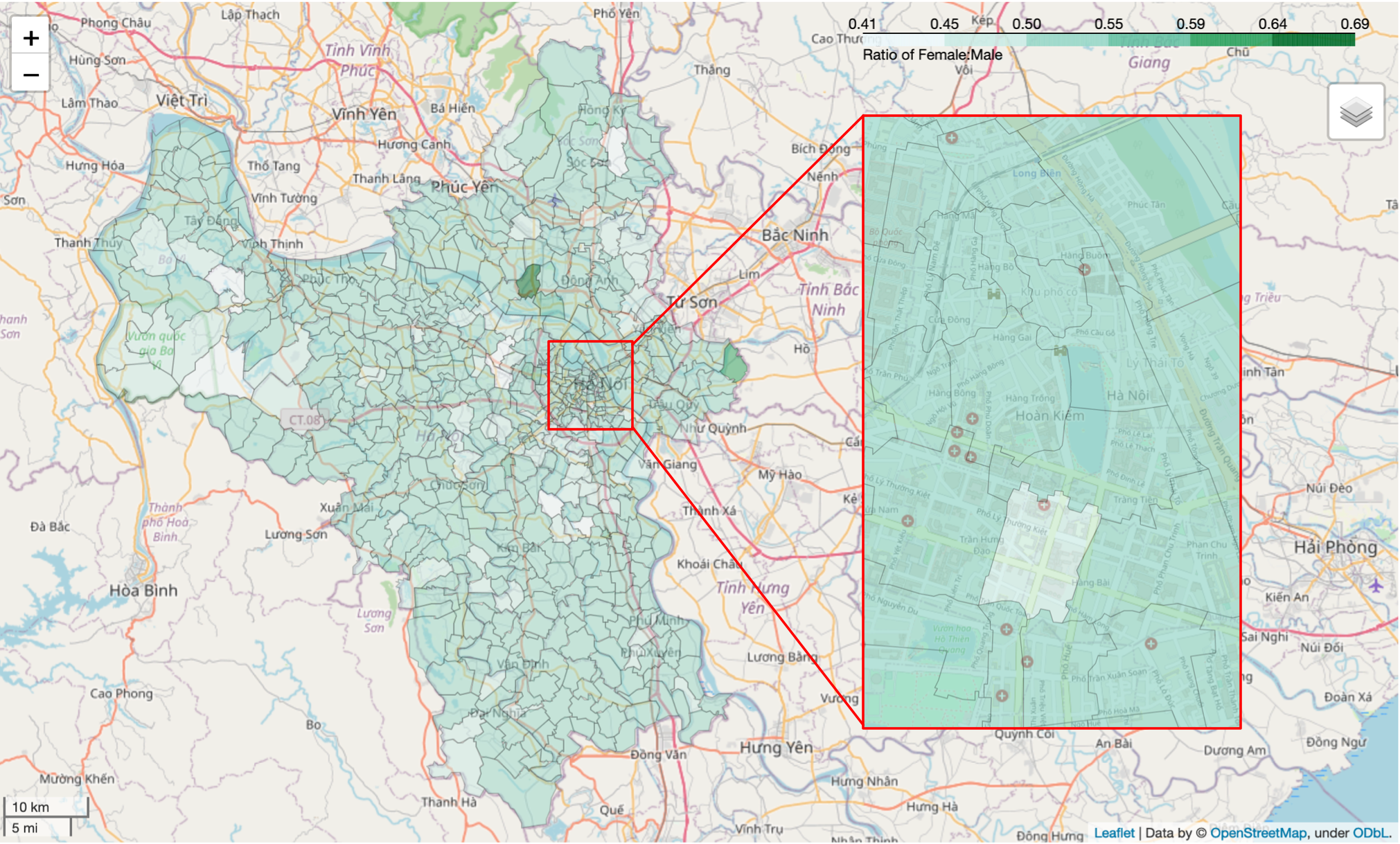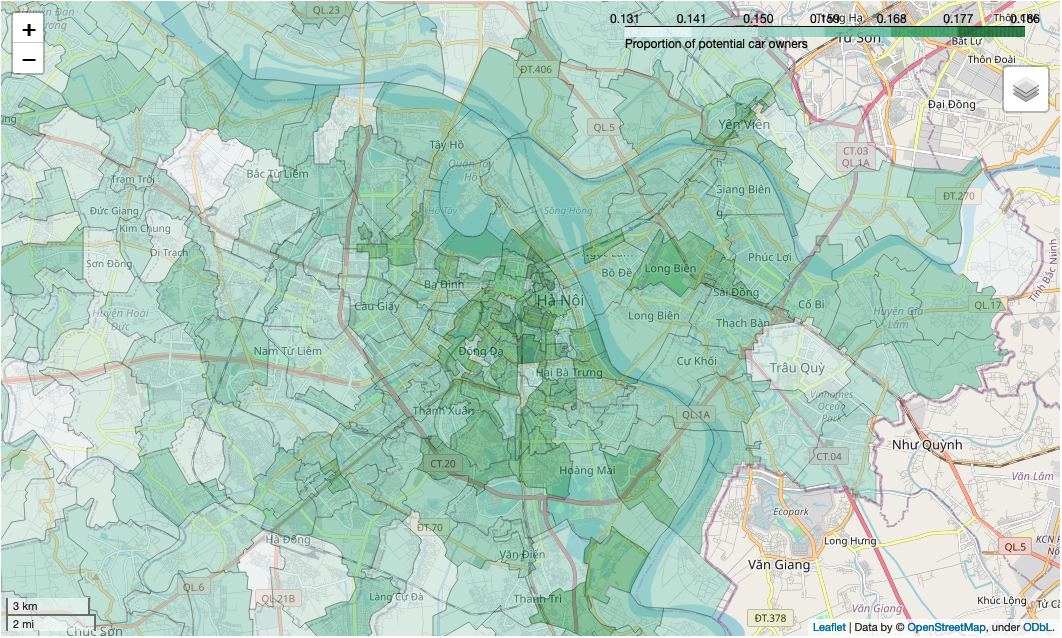
Urban Data Science for Sustainable Transport Policies in Emerging Economies
Nick Malleson,
Hang Nguyen Thi Thuy, Thanh Bui Quang, Minh Kieu, Phe Hoang Huu, Alexis Comber
University of Leeds, UK; VNU University of Science, Hanoi, Vietnam;
University of Auckland, New Zealand
Paper available here: here




Abstract
In the city of Hanoi, Vietnam, as with other rapidly-developing cities, transport infrastructure is failing to keep pace with the burgeoning population. This has lead to high levels of congestion, air pollution, and a broad inequity in the accessibility of large parts of the city to residents. The emerging discipline of Urban Data Science has a valuable role in providing policy makers with robust evidence on which to base policy, but the discipline faces problems with the application of techniques that are based on assumptions that do not hold when applied to emerging economies.
This paper presents the preliminary outputs of a new programme of urban data science work that is being developed specifically for Hanoi. It leverages a spatial microsimulation approach to up-sample a bespoke travel survey and create a synthetic representation of the transport preferences of all residents in the city. These new data are used to assess the impacts that changes in the broader socio-economic context, such as increasing prosperity amongst residents, could have on rates of car ownership and hence on the problems of congestion and pollution. The results begin to highlight parts of the city where the impacts of improved economic conditions coupled with changes to wider transport policies might lead to greater use of personal cars in the future.
Aims & Motivation
Transport infrastructure falling behind in rapidly-developing cities
Pollution, congestion, inequality in accessibility, etc.
Urban Data Science (UDS)
Role in providing policy makers with robust evidence for policy
But some applications/techniques break down in developing cities
Research
Analysis / modelling work to support transport policy in Hanoi
New household transport survey; combined with census data
Answer questions about impacts of possible policies
E.g. banning motorbikes from the city centre
Background & Context
Application of UDS techniques could help to alleviate transport-related problems. But difficult to apply some 'Global North' techniques in emerging economies, e.g.:
Smart card data / intelligent transport systems, "analytics-empowered, intelligent traffic management"
Difficulties with data
Systems that are ad-hoc, organised from the ground-up, cash-based, etc.
Difficulties with modelling
Different driving behaviour behaviour
Different vehicle types: 90% vehicles in Hanoi are motorbikes; 2.5 motorbikes per person
Background & Context
Project: Urban Transport Modelling for Sustainable Well-Being in Hanoi
Collaboration between University of Leeds, VNU University of Science, University of Auckland, R&D Consultants
Funded by the British Academy
Limited digital data on transport flows
Fall back on a household travel survey and up-sample using the 2019 census
Synthetic population generation
Propensity score matching

Data
Household travel survey
Aim for 10,000 respondents
got to 1,500 ... then March 2020 ...
recently moved a shorter survey online
Questions:
Demographics: sex, age group, occupation
Vehicle ownership: types of vehicles owned by the household
Travel behaviour: regular journeys made (locations, modes, reasons)
Vehicle ownership aspirations
Opinion on possible motorbike ban
Data

Vietnam Census of Population
Conducted in 2019
8M people in Hanoi
We have access to district-level sex and age counts

Synthetic Population Generation
Aim: upscale the survey by combining with the census data
Aka microsimulation
Clone individuals in the survey to create an individual-level population with census and survey attributes
Characteristics of synthetic population matches aggregate distributions
Iterative optimisation algorithm simplified from simulated annealing
Implemented in the Flexible Modelling Framework
Preliminary Results
People who want to own a car in Hanoi.
Extract synthetic individuals who:
(i) do not currently own a car;
(ii) would like to own a car in the future;
(iii) cost is the main factor that is preventing them

Aside: Census Mircordata and PSM
Possible access to census microdata
Alternative to synthetic population generation: propensity score matching
Attempt to link survey respondents to census individuals based on demographic (etc.) factors
Conclusions & Future Work
UDS in Vietnam
Some UDS approaches, e.g. focused on 'smart cities' infrastructure not applicable
Smart card data / intelligent transport systems?
Differences in attitudes to ethics, trust, and data privacy
Conclusions & Future Work
Summary
Large household travel survey to investigate where, how, and why people travel
Up-sample through combination with the census
Synthetic population generation or propensity score matching
Answer policy-relevant questions
Towards a new Urban Infrastructure Data Centre for Hanoi

Urban Data Science for Sustainable Transport Policies in Emerging Economies
Nick Malleson,
Hang Nguyen Thi Thuy, Thanh Bui Quang, Minh Kieu, Phe Hoang Huu, Alexis Comber
University of Leeds, UK; VNU University of Science, Hanoi, Vietnam;
University of Auckland, New Zealand
Slides available at:
https://urban-analytics.github.io/dust/presentations.html



